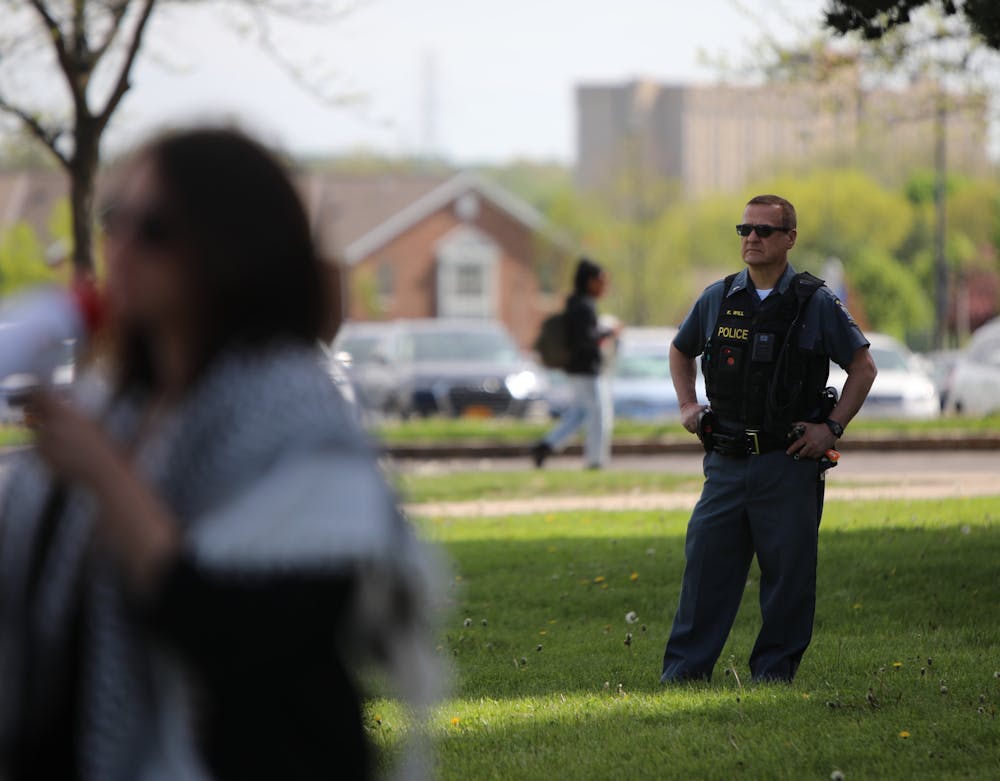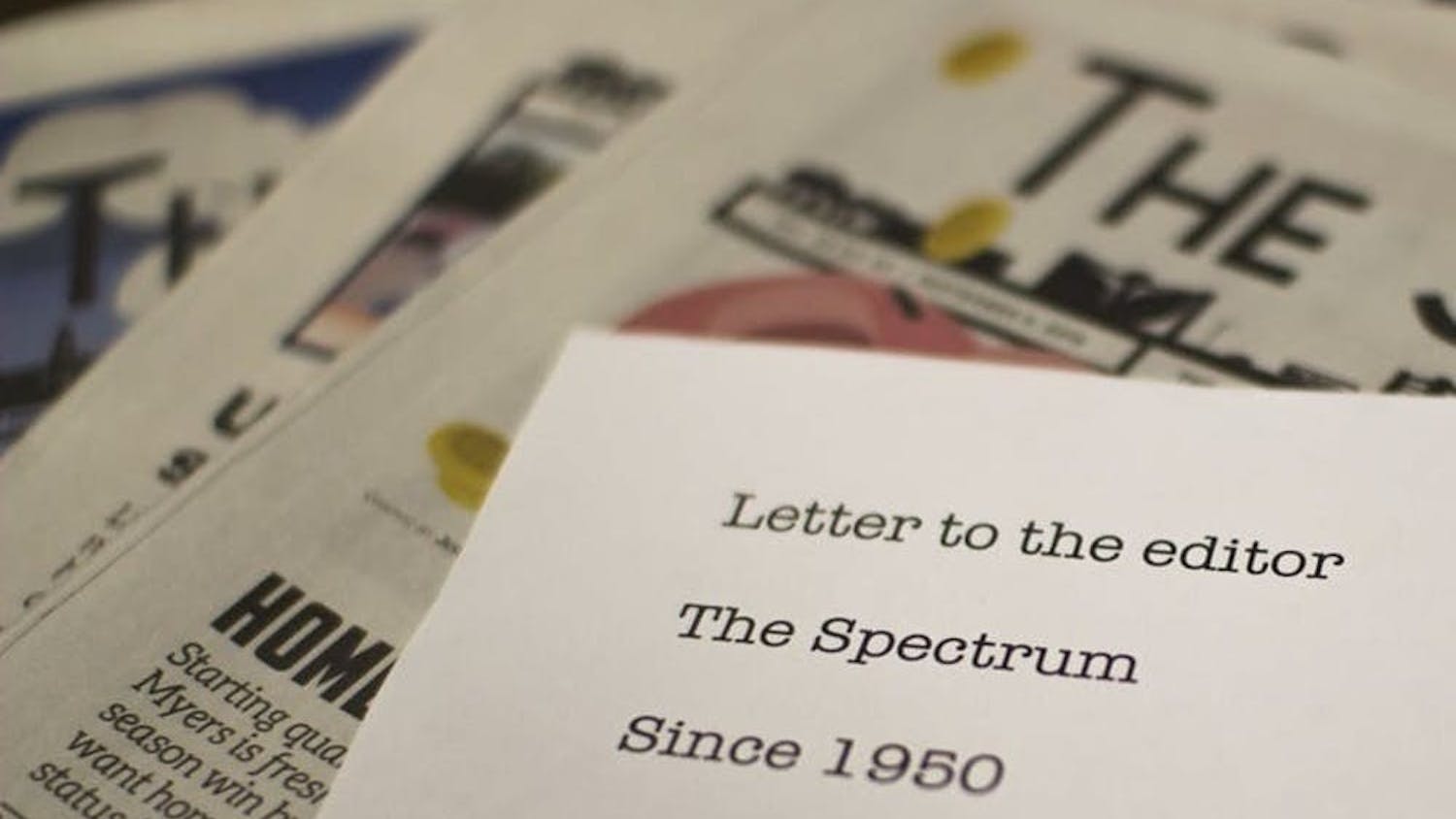Two pro-Palestinian demonstrations and one pro-Israel rally made their way through UB’s North Campus on Sunday and Monday, extending a tumultuous week of protests on campus that began Wednesday afternoon.
Last Wednesday, May 1, about 85 protesters calling for the UB Foundation to divest from Israel attempted to form an encampment in a lawn near Hochstetter Hall. After demonstrators removed the tents to comply with police orders, the protest transitioned to a sit-in.
Later that evening, dozens of University Police (UPD) and outside police officers arrested 15 demonstrators, including seven UB students, for remaining after sundown. A protest organizer said 18 protesters were arrested.
Police were seen tackling demonstrators and allegedly ripped off one woman’s hijab. A UB spokesperson said one protester was hospitalized and two police officers were injured. An organizer said two protesters were hospitalized.
Hundreds marched on Friday to decry the police use of force and continue to call for divestment, and groups of faculty and alumni penned open letters condemning the university’s handling of Wednesday’s protest.
Sunday night: SUNY UB BDS vigil
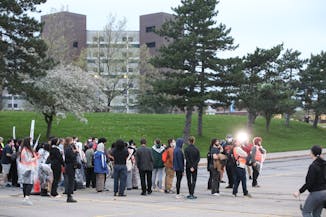
Demonstrators enter Jacobs Lot A just after sundown Sunday night.
About 35 demonstrators, led by classics graduate student Tina Bekkali-Poio, held a vigil and protest Sunday evening in the Hochstetter Hall lawn where many of last Wednesday’s arrests took place.
During her speech, Bekkali-Poio lambasted UB administrators’ response to Wednesday’s protest.
Hussain, a SUNY UB BDS organizer who asked that her first name be withheld, said the march asserted demonstrators’ rights to speak on campus after Wednesday’s arrests.
“The whole point of this was to highlight our right to protest after dark, which we achieved by taking the weird route,” Hussain wrote in a text message.
The vigil, which lasted until sundown, drew a substantial police presence. At least a dozen police vehicles — from UPD, Amherst Police and New York State Police, including an Erie County Department of Homeland Security and Emergency Services mobile command truck — were stationed in the immediate area of the vigil.
Staff inside the mobile command truck said that command operations were being handled in Bissell Hall, UPD’s headquarters.
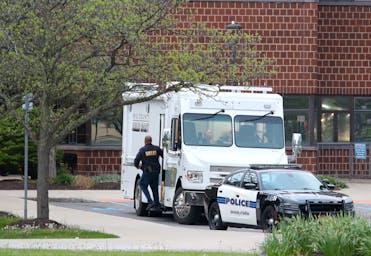
An Erie County Department of Homeland Security and Emergency Services mobile command truck sits near the site of Sunday night's vigil.
An out-of-service UB Stampede bus arrived adjacent to the protest about half an hour before sundown. The driver of that bus said he did not know where the bus was going or why he had been dispatched. Police previously used a Stampede bus at Wednesday’s protest to transport arrested demonstrators.
Hussain said police requested identification from her and other students wearing the keffiyeh, the scarf that has become a symbol of solidarity with Palestinians.
In the minutes after sundown, the group marched through a parking lot to the corner of Flint and Augspurger Roads, before crossing Flint Road to the Jacobs A parking lot and dispersing.
Monday, noon: Jewish Student Union march
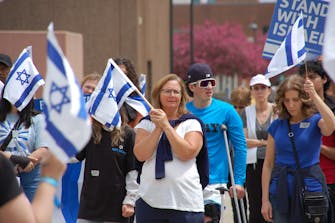
Pro-Israel demonstrators listen to a speech Monday.
Around 75 demonstrators, including several dozen congregants of an Orchard Park church, joined a Holocaust Remembrance Day rally led by the Jewish Student Union (JSU) in support of Israel. JSU promoted the event as a “march for Israel,” and a “march to stop Jew hatred on University at Buffalo’s campus.”
Demonstrators walked from Alumni Arena to Founders Plaza and back, playing music through a loudspeaker, with speeches outside Alumni and at Founders Plaza.
Speaking to the crowd at Alumni Arena, urban and regional planning professor Ernest Sternberg warned of rising antisemitism, and compared pro-Palestinian protesters at UB to Nazis.
“We are not again picking up our valises, putting on our best Shabbat clothes, collecting our children and marching meekly at the Nazis’ orders to be shot and thrown into different cattle cars. It’s not going to happen again,” Sternberg said. “Some of the malicious agitators — most of them from off campus — who were here last week, are trying once again to put Jews into cattle cars. This time, they will fail… On this Holocaust Memorial Day, we have the strength, we have the will, we have the energy to win over enemies bent at destroying us.”
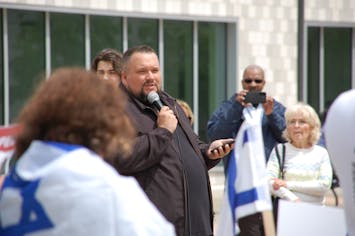
Doug Reed, pastor of The Tabernacle church in Orchard Park, speaks at a pro-Israel march Monday.
Doug Reed, pastor of The Tabernacle church in Orchard Park, says between 60 and 70 of his church’s congregants came to the march to show support for Jewish students.
“The Jewish students on campus, I hope, feel a sense that they’re not alone,” Reed told The Spectrum. “The vast majority of the people that are here — and I think this is the misnomer of the whole thing — the vast majority of people that are pro-Israel want the war to end tomorrow. If Hamas would give up their weapons and return the hostages, the war would be done. If Israel lays down their weapons, there’d be no more Israel. And that’s the bottom line.”
JSU president Hudson Hort says that while he doesn’t accuse all pro-Palestinian protesters of antisemitism, he still believes it was present on campus at Wednesday’s and Friday’s protests.
“There is something inherently antisemitic with the movement. In the twentieth century, it was more or less adopted as consensus that every ethnic group has the right to national self-determination,” Hort said. “To say this is true internationally, this is true for every ethnic group, but this is not true for the Jews, is antisemitic. Either it is denying that Jews deserve the same rights as any other group, or denying the fact that Jews as a group even exist — both of which are antisemitic.”
The JSU followed the afternoon's march with a panel on antisemitism in Cooke Hall to commemorate Holocaust Remembrance Day. The three panel members — Students Supporting Israel president and senior public health major Brandon Meyer, junior computer science major and former Israeli Defense Forces (IDF) Lieutenant Elisha Amiri and alum Or Kop — said they had experienced more antisemitism on campus following Hamas' Oct. 7 attack on Israel and Israel's subsequent invasion of Gaza.
“[Anti-semitism] was not really existent before,” Amiri said. “We might have felt a little bit of discomfort, but nothing like what we see now.”
An 18-year-old student was arrested later on Monday after he posted a story encouraging violence against the rally on a public Snapchat group.
Monday, 3 p.m.: School of Social Work protest
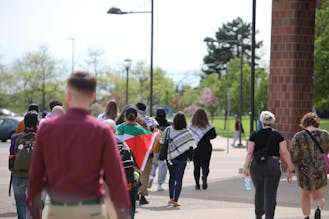
Students and faculty in the School of Social Work pass Capen Hall during a march advocating for Palestinians.
Two dozen social work students and faculty members marched to Hochstetter Hall, where speakers decried Israeli airstrikes on Rafah and shamed UB’s School of Social Work and the National Association of Social Workers (NASW) for failing to take a stance.
One speaker, a social work student who asked not to be named, told attendees that NASW has shirked its responsibility to advocate for marginalized people. She cited NASW’s Code of Ethics, which calls on social workers to “advocate for changes in policy and legislation to improve social conditions to meet basic human needs and promote social justice.”
Monday’s protest was unaffiliated with the organizers of prior pro-Palestinian protests at UB.
Darcy Winter, Mylien Lai and Grant Ashley contributed reporting to this article.
Sol Hauser is the senior news editor and can be reached at sol.hauser@ubspectrum.com
Sophia Stines is an assistant features editor.

